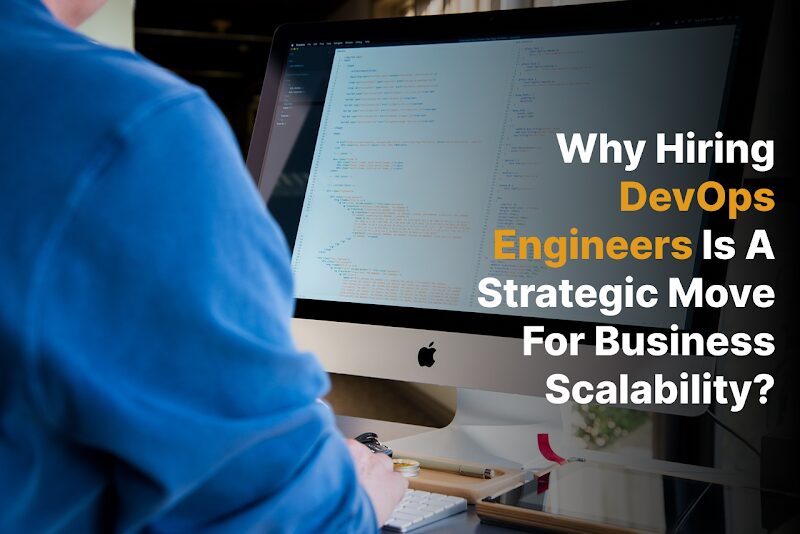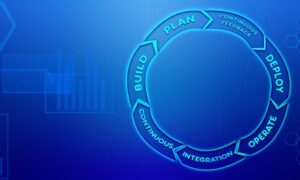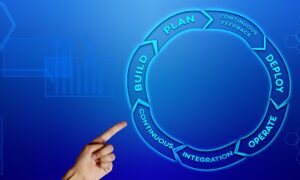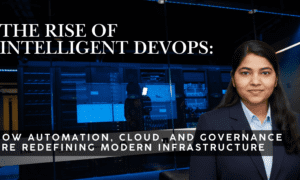Valued at USD 10.4 billion in 2023, the DevOps market is expected to grow at a CAGR of 19.7% from 2023 to 2028, yielding an estimated revenue forecast of $ 25.5 billion, according to a Markets and Markets report. The rapid demand for DevOps expertise bears testimony to more and more businesses recognizing the limitations of traditional software development methods for their development speed and efficacy. As such, businesses look to hire DevOps engineers to enhance their strategic edge in remaining agile, pushing quality software releases consistently, and strengthening the core fabric of their software development machinery for desired returns as they scale.
This blog will help you understand DevOps benefits for businesses, how DevOps engineers facilitate sustainable growth and scale, and the different hiring models available to access top-tier DevOps experts.
Benefits Of DevOps For Business
DevOps for business is a strategic growth asset that consolidates development and operations teams into a unified functional unit and eliminates the limitations of siloed functioning. Discussed below are DevOps benefits for scalability:
1. Time To Market
Businesses that hire DevOps engineers can innovate at a higher velocity and respond to evolving market demands faster. Improved collaboration between development and operations teams, automation of previously inefficient manual development processes, and higher speed of testing and delivery ensure accelerated development and faster time to market.
2. Agile Transformation
DevOps engineering enables businesses to respond to evolving customer needs faster by facilitating quick identification and resolution of bugs, faster iterations, and consistent quality releases. As such, businesses can adopt a more collaborative development approach that aligns with customer demand, maximizes on customer feedback through quicker feedback loops, and resolves issues early on in their software development lifecycle before they escalate into major performance loopholes.
3. Risk Minimization with DevOps Scalability
DevOps practices like infrastructure as code (IaC) minimize development and deployment risks by allowing businesses to automate their infrastructure and manage development processes for complex, evolving, and changing systems at scale. IaC, for example, helps businesses improve their testing, production environments, and development in enhanced frequencies.
4. Deployment Automation
Businesses that hire DevOps engineers can automate their deployment processes to minimize human error, ensure faster releases, accelerate iteration cycles, improve deployment reliability, and enhance collaboration and visibility across all teams. This directly translates to faster releases, improved efficiency in managing increasing workloads, and optimized infrastructure scaling to manage dynamic changes.
5. Continuous Integration
The DevOps CI/CD pipeline is pivotal to development and organizational success. As a DevOps practice, continuous integration enables developers to periodically merge codes in a central repository, facilitating further automated builds and tests. Continuous integration is pivotal for identifying and resolving bugs faster, reducing the validation time for release quality, and improving overall software quality.
6. Cloud Automation Hiring
Cloud automation is an essential component of DevOps engineering and is crucial for improving the efficacy of provisioning and managing cloud environments. It is particularly useful for managing complex IT environments and projects, and enables all businesses to unlock the complete potential of cloud computing designed for scale.
7. Security
By hiring DevOps engineers, businesses can prioritize the implementation of security practices in a fast-paced development, testing, and delivery model, and integrate robust security practices from the outset. DevOps prioritizes security with best practices like automated compliance, configuration management, and role-based access, ensuring your systems are secure and preventing malicious risks that threaten the software development lifecycle.
DevOps Engineer Responsibilities
With the central role of mobile app development services in determining business success in today’s digital era, the responsibilities of DevOps engineers are paramount. Listed below are the major responsibilities of a DevOps engineer for an organization’s IT project success and management of the software development machinery:
- Implementing and managing IT infrastructure, other automating, development, and testing tools.
- Understanding how customer requirements and IT projects KPIs make business sense.
- Setting up development, release, update, and other processes necessary for DevOps operations.
- Reviewing and validating software code for each project.
- Identifying and resolving bugs with effective troubleshooting and problem solving.
- Monitoring processes across the entire software development lifecycle and identifying areas for improvement.
- Implementing robust cybersecurity measures after thorough vulnerability assessment and risk mitigation.
- Selecting, deploying, and managing CI/CD tools.
- Managing the CI/CD pipeline and ensuring frequent feedback loops, faster iterations, and quicker releases.
DevOps Practices Explained
DevOps success requires a cultural shift in the organization’s mindset to eliminate the siloed functioning of development and operations teams, enhance developers’ productivity, and enhance the quality of software releases. Mentioned below are its core practices:
- Continuous Integration: A practice enabling developers to merge their code to a central repository for further automated tests and builds.
- Continuous Delivery: A practice automating the build, testing, and preparation of code changes for release to production, giving developers a ready-to-deploy artifact validated through a standardized process.
- Microservices: A design approach using which an application is built as a set of independent services or components, each with its own processes.
- IaC: Provisioning and managing infrastructure using version control, continuous integration, and other software development techniques.
- Monitoring and Logging: Monitoring logs and metrics to analyze the impact of application and infrastructure performance on the end-user, essential for 24*7 availability of services.
Contract vs Full-Time DevOps Engineer Hiring
If you are thinking about how to hire DevOps engineer, the two most popular hiring options are contractual hiring, or outsourcing, and full-time hiring. Let’s compare them against key criteria:
Cost
Outsourcing costs for DevOps engineers start at $20/ hour for junior experts and can go up to $30/ hour for senior experts. This is significantly less than hiring a full-time in-house member, paying for competitive monthly salaries, employee benefits, in-office charges, and infrastructure expenses.
Deployment Readiness
If you hire dedicated software development team for DevOps management, you get ready-to-deploy experts trained on an ongoing basis. Full-time team members require years of ongoing training to reach the required level of expertise and competitiveness.
Flexibility
Agility to upsize or downsize your development resources as you scale is necessary for efficiently responding to market demand. Outsourcing DevOps engineers enables you to hire experts on a project-by-project basis, as opposed to a full-time team, whose engagement does not offer as much flexibility.
Experience
Outsourcing DevOps experts have years of experience and precision catering to different projects, while in-house teams can build the same level of institutional expertise after years of investment. As such, contractual hiring answers present requirements better and instantly.
The Future Of DevOps : Are DevOps Engineers In Demand?
Yes, now more than ever, as businesses strive to gain a competitive edge and improve their operational efficiency, development lifecycle, and productivity in the face of dynamic change. With AI/ML, cloud native architecture, and growing demand for software development speed and efficacy, specialised DevOps roles will continue to determine business success in the days to come.
Author Bio:
Carol Lookwood is a seasoned mobile app developer and technical content writer at Sciflare with over 5 years of experience, specializing in iOS, Android, and hybrid app solutions. Her expertise spans intuitive UI design, and she is passionate about helping startups successfully launch their projects while staying ahead of evolving market trends. She contributes to delivering specialized services that help businesses hire remote developers, offering flexible and scalable solutions tailored to each client’s unique needs. Learn more about how she can help your business thrive.



































